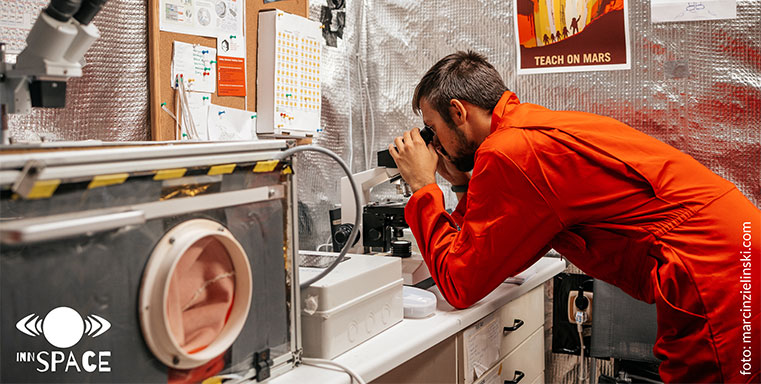
The members of the Innspace group are young scientists working on space-related projects. Their ranks include representatives from fields such as engineering, robotics, architecture, as well as medicine and biotechnology. The research mission was attended by: Beata Suścicka (as Commander), Justyna Pelc (as Vice Commander / Astrobiologist), Nikodem Drąg (as Communication Officer), Dominik Tokarz (as Data Officer), Cyrus Sidor (as Crew Medical Officer) and Marcin Zieliński (as Public Outreach Officer). The multidisciplinary team spent a week in complete isolation from outside light, simulating a crewed Moon voyage. During the mission, crew members had many activities and challenges.
An analog habitat is a place that simulates specific conditions similar to those in space. In this case, on the Moon. There are only a few such places in the world, including two in Poland.
“Our schedule for the day was extremely tight. We had assigned research and tasks to be performed by MCC (Mission Control Center), in addition, each of us had individual projects planned. The habitat space was limited, so we had to make a precise schedule for each day to meet all of our goals. As a Commander, my main task was to plan the optimal schedule and make sure that everyone completed their tasks on time. Every minute on the Moon is important. “- says Beata Suścicka, Commander.
Analog astronauts live in a habitat consisting of the following modules: a bedroom, a kitchen, a laboratory, a gym, and a bathroom. Every morning they are woken up by the Commander on the MCC signal. The day started with morning examinations. Then such tests had to be repeated every two hours.
“I think this week spent on the mission was a test for all of us. A test of our ability to cooperate, patience and perseverance. It was a time when we could get to know each other, but also get to know ourselves as people – our behaviour and physiology. As a Medical Officer, I was responsible for collecting and analyzing several medical data such as body weight, blood pressure, blood oxygenation, urinalysis, fluid intake and excretion. Of course, this was related to ensuring our safety in isolated conditions, in which medical assistance may arrive with a considerable delay, but also made each of us aware of how we function daily. ”Says Cyrus Sidor, Crew Medical Officer.
In addition to the tests, there were exercises in the day plan. Every day, the astronauts had an hour of individual training and one hour of group exercises to complete. An important part of the day was time for research and projects. The crew did not forget about basic activities such as time to sleep, relax or eat.
“We had to follow a strict vegetarian diet – 2,000 kcal. We prepared the meals ourselves, according to a schedule at specific times. Two people interchangeably, so everyone prepared a meal every day. We also had the opportunity for greater integration, ”says Marcin Zieliński, Public Outreach Officer.

Among the most important project experiences was the study of subjective time perception and the biological clock. Astronauts were completely isolated from sunlight and the outside environment. The simulation of sunlight with the use of special lamps around the clock had a direct effect on the change of the rhythm of the day and night as well as concentration.
Analog astronauts conducted research on algae and watercress in the laboratory. Everyone had an individual task that was summed up together at the end. Team members studied seed growth in microgravity and magnetic fields, and compared growth across terrestrial, lunar and martian soil.
The Innspace team also experimented with relaxation. Each of the crew members had to take a 20-minute nap after their hour of exercise in a specially designed space. Vinci Power Nap is an innovative efficiency improvement system based on a regenerative nap as an energy source, designed by Magdalena Filcek.
The team had to follow all assigned tasks and rules by MCC for security purposes. “There were a lot of challenges. Already in the first hours, we had to develop an efficient ventilation system in order to have access to good air. My team and I relied on the results of the sensors in each room and after two days we designed the optimal system. ” – says Dominik Tokarz, Data Officer.
At the end of the stay, the analog astronauts also had to face an emergency simulation. They had to face the coming meteor shower. “The emergency caused us a lot of stress, but we had to stay calm and stick together. The Communications Officer needed to keep in touch with the MCC, who guided us during the simulation. It was extremely helpful because it was a completely new and unknown situation for us. We had no electricity for the duration of the simulation and we had to crawl on the floor for safety reasons. ” – says Beata Suścicka, Commander.

In recent years, we have observed a trend of using analog missions for scientific and research activities in various fields. The activity of research habitats has a great impact on the development of technology, science and educational activities.
“The mission in the habitat was an amazing experience. I learned a lot about myself, especially how isolation affects my psyche. As a Communications Officer, I kept in touch with the Mission Control Center. I was also able to perform an experiment on the influence of the magnetic field on living organisms, ”says Nikodem Drąg, Communication Officer.
So far, we have dealt with the conceptual design of space bases on Mars and the Moon, which have been awarded in many international competitions.
“The Innspace Association likes to leave its comfort zone and try new things, so we decided to test our projects in practice. We believe that a good project requires understanding the needs of the recipients. ”- says Justyna Pelc, the leader of the Innspace group.